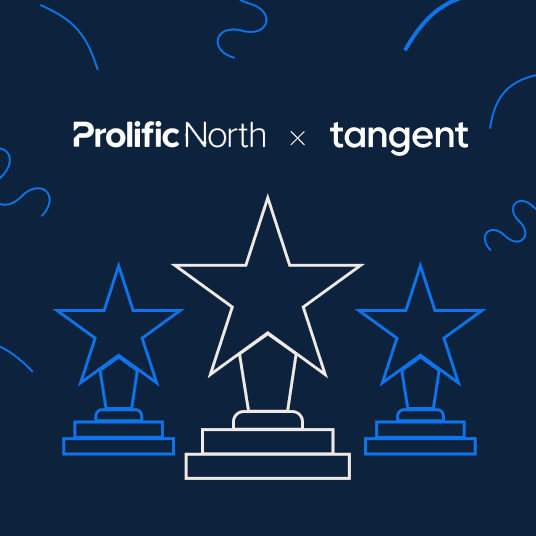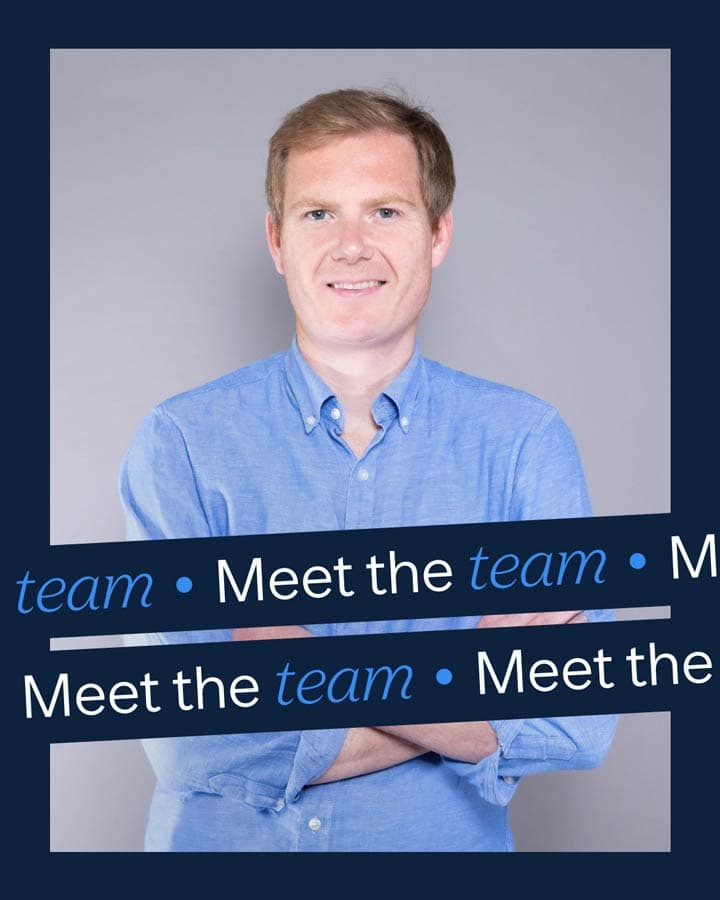
Tech leaders across the North recently came together to share their insights on talent, emerging technologies, and the challenges and opportunities facing tech businesses heading into 2024.
Gathering at Bruntwood SciTech’s No 2 Circle Square, based in Manchester, the leaders also celebrated their wins from Prolific North’s recent Tech Awards which was hosted at Manchester United Football Club on 9 November.
During the morning roundtable discussion, they shared their reflections on access to talent and recruitment, insights on attracting investment and securing funding for growth, how their businesses are tackling advances in AI, and opportunities to tap into in 2024.
Attendees:
- Chaired by David Prior, editor at Prolific North
- Andrew Barlow, founder and CEO at Chatloop
- Marcus Hadfield, chief strategy officer at Apadmi
- Lewis Taylor, business consultant at Sync
- Kieron Shiel, VP engineering at AeroCloud Systems
- Richard Trigg, design partner at Tangent (attending remotely)
- Anthony Main, founder, The Distance
- Darren Haken, engineering director at AutoTrader
- Jonathan Moran, tech director at Better Placed
- Rich McIntyre, chief engineer – Leeds – BJSS
Kicking off the discussion, Prolific North’s editor David Prior welcomed attendees and congratulated them on their wins at the recent tech awards. He asked how the year has been for each business, and how confident they are heading into 2024.
Despite a picture of mass layoffs and financial woes across major global tech companies, Lewis Taylor (Sync) said business has been “steady.” Looking at the number of new starters joining, if this increases then it’s often a good indication that business is doing well.
The start of 2023 was better than last year, added Anthony Main (The Distance), but it’s still 20% down on new business. Despite this, the company has “confidence going into the new year.”
For Andrew Barlow (Chatloop), who is also a founding member at digital adoption platform AppLearn, it’s been a very different picture across both of his companies. AppLearn has been going for 10 years but as b2b enterprise budgets have been frozen, for a B2B business it’s been “really tough this year.”
Whereas at Chatloop, which is a pre-revenue business, the company has not experienced the same challenges. Although he doesn’t intend to raise venture capital funds for Chatloop at the moment thanks to a “poor market right now,” it’s indicative of a wider issue for tech businesses raising capital which has been “tough for the last few years.” As scrutiny of VCs is “higher than before” it’s having an impact on the quality of deals, but he noted VC firms often use economic issues to their advantage when looking to make investments.
Speaking to the room via video link, Richard Trigg (Tangent) said he has definitely seen cost-saving measures across the year with enterprise level clients but it has given his company an “opportunity.”
For Rich McIntyre (BJSS) he explained how he saw “explosive growth during covid” with the company almost doubling in size. In 2023, BJSS has seen “some growth this year” but it’s not as much as previously expected.
As companies start to watch their budgets, he sees this as a continuing trend over the next few years with high interest rates. While lots of companies are being “quite conservative,” it’s all about “looking out for those opportunities, addressing custom concerns and looking at quality.”
The B2B side of the business at AutoTrader is “strong,” explained Darren Haken (AutoTrader), as a lot was done to support it over Covid. On the consumer side, despite inflation people will always want to buy cars. They have seen a “bit of a downturn” with consumers moving towards purchasing used cars rather than new cars. After venturing into new areas such as leasing, he said it has been “tougher” and is “harder to penetrate that market” but is still “very confident as we can bring tech to the market.”
Overall, there is continued growth in users and revenue, and AutoTrader has been “good” at attracting the right staff. However there is more caution, the business is now more careful about other businesses it works with, digging “deep” into things such as performance and revenue. Previously, AutoTrader wouldn’t have hesitated at trialing a SaaS platform in AI for instance.
Challenges in the tech industry and recruiting/retaining talent
Prior asked the leaders if they had seen any challenges when it comes to attracting or retaining talent. Jonathan Moran (Better Placed) explained how looking back to 2022, this year has been “different.” It has been the “year of readjustment” and believes it isn’t going to change much. Barlow (Chatloop) asked if that’s a good thing as developer salaries were “getting bad.”
Moran (Better Placed) agreed. “It needed to happen,” he explained. It became like a “beauty parade” where tech talent was so sought after, the salary and benefits expectations from prospective employees was high. Now, some of the conversations he’s having is that salary is not the “be all and end all.”
At the peak of the demand for tech talent, those with two years of experience were asking for salaries upwards of £100,000, explained McIntyre (BJSS). There’s been a shift in the type of talent in demand, previously clients were asking for junior staff whereas now it’s more senior/management level. Despite this, he says junior staff are “struggling” to get onto the ladder.
The best approach is how BJSS had an academy, training up staff while also hiring some talent from outside the business too. Using this approach means you get a “reasonable spread” but clients are now after specialist hires such as tech leads and data engineers. “You’re not going to find them coming out of university,” he explained. Those senior staff have been “around a few years.”
Prior asked if the skills deficit in the North is now easing. Haken (AutoTrader) explained when the salaries are higher in regional hubs, it brings in more senior engineers. Despite this, he said the North “still has a deficit of talent,” salaries can’t keep inflating forever but it can lead to a “brain drain” issue. By paying well, more potential staff will be tempted to move from London. However, he has seen numerous candidates asking for “ludicrous money but without skill.”
Barlow (Chatloop) said these types of issues with talent are prevalent in the likes of Silicon Valley, but remote working is an attractive benefit to many potential employees.
At Better Placed, which also works with a number of large-scale tech businesses on the US west coast, Moran has seen those businesses recruiting remote staff from Manchester. The thing that worries him though, is there are “less opportunities for junior tech staff.” Agreeing with the others, he said “so many businesses want ready-made mid-level developers but don’t know how to address it.”
Marcus Hadfield (Apadmi), explained how the digital consultancy has its own training and development academy for apprentices and graduates. Graduates can be “highly valuable” and Manchester has become a “very attractive place” to move to, with the opportunities available thanks to existing infrastructure, universities, and a lower cost of living.
However Barlow (Chatloop) said across both of his companies, there used to be a “gulf in talent” in comparison to today. It’s a similar picture with sales talent, trying to find an enterprise sales person based in Manchester to sell to American companies had been a struggle but that picture is now improving.
Prior asked if the quality of staff coming on board now has improved. Hadfield (Apadmi) said any challenges are the same no matter what country you’re in. Apadmi acquired Netherlands-based The Mobile Company last year to expand its foothold in Europe, and it’s a similar picture with talent there.
For Haken (AutoTrader), he referred back to the inflated salaries and said some of the offers have been “absurd” and lots of organisations still haven’t grasped what technical expertise looks like.
“If you don’t compete a bit more with London or other hubs, you won’t attract that talent,” he emphasised. Post-brexit, AutoTrader has found more staff are coming in internationally to Manchester and the move has made it easier for skilled workers to come to the UK, increasing diversity.
It’s a similar picture Moran (Better Placed) has seen, with an influx of staff coming to the North from as far afield as Australia and New Zealand.
Regional hubs
It’s not all about Manchester though. Rich McIntyre (BJSS) said although it’s been a tough year, Leeds has really proved itself as a hub with more than 24,000 roles in the tech sector across the region. When he first came to Manchester in 2012, MediaCity was being established and was almost like an “experiment” at the time. Both cities have since proved themselves.
It’s one of the reasons Better Placed decided to open an office in Leeds, explained Moran. Hadfield (Apadmi), agreed, it’s not just these two Northern cities making waves either, it’s all of the North.
Anthony Main (The Distance) stressed the importance of extra hubs to connect the tech community to events, so that they can easily find local peers if they are hybrid or remote workers. Thanks to the number of open vacancies, staff will “always want to move on and try different things,” explained Lewis Taylor (Sync). It’s easier to flit around and there’s no real appetite to help grow a business – staff will always look at what’s available.
In a bigger company like AutoTrader, it’s easier for staff to move around or progress their careers, said Haken (AutoTrader). Staff value the company’s culture and being located in the middle of Manchester city centre.
The discussion turned to volatility and uncertainty in the market thanks to job cuts across major tech companies. “You do worry,” said McIntyre (BJSS). However, it’s an opportunity for start-ups or smaller, scaling businesses, added Barlow (Chatloop). It means he’s picked up “great talent” that wouldn’t ordinarily be available.
Richard Trigg (Tangent) said there is a lot of work being done on recruitment at the moment. From a design perspective, the lines have become blurred between junior, mid-weight and senior but “good people stick out like a sore thumb.” Tangent can often see around 1,000 applicants just for one role but it’s all about finding the good ones and it can become time consuming. There might be many divides between London and the North but the salary gap has “disappeared.”
Opportunities for 2024 and emerging technologies
Wrapping up the discussion, Prior asked leaders around the table what opportunities there are for the tech sector in 2024, with the emergence of new technologies.
McIntyre (BJSS) said it’s about “guiding companies” through this new technologies. There is a lot of hype around AI but the challenge is now about how to “cut through that noise” and help businesses find the solutions that are “meaningful.” There will be more opportunities for companies to leverage AI, and it will make it easier for software development, yet he’s worried about the “rise in rubbish things being created.”
He said he was particularly impressed by AutoTrader’s digital transformation, from a magazine to a data-driven company. Haken (AutoTrader) went into detail that transformation and how moving from print to digital was a “big moment” for the business. On the tech side, AutoTrader has already been working with machine learning for the last seven years. Seeing the “hype” around machine learning, ChatGPT and AI has been “one of the strangest moments” of his tech career to date.
Although this phase of AI has caught the “world’s imagination” and is exciting, AutoTrader is trying not to get too fixated with new AI techniques.
For Barlow (Chatloop), AI is being used at his company for data acquisition. He said you have to “try and find ways to stand on the shoulders of giants” and using open source tech allows his business to build solutions that can scale. At Chatloop, AI is used as a tool to “supplement” its solution rather than purely using it as a solution.
“We’re trying to close the gap by using it to our advantage,” although pointed out that ChatGPT can be leveraged as a smaller company for data acquisition whereas for large companies like AutoTrader it would be throttled.
McIntyre (BJSS) pointed out that there’s plenty of other models and opportunities out there, rather than just relying on throttled Open AI. The risk for companies is “how fast it’s moving,” said Haken (AutoTrader).
Prior asked if there were any thoughts about the impact AI might have on tech jobs. Main (The Distance) said it won’t replace people but it will help provide them with more tools. At Apadmi, Hadfield said it’s been a good year as products are “business critical.” Being able to do more and create value for clients with emerging technologies creates better relationships.
Although AI is an opportunity, you can’t “leapfrog ahead,” explained Haken (AutoTrader). “If you’re a good business, you’ll execute on it. Everyone is moving so quickly at the moment, the competitive edge can be short-lived.”
Trigg (Tangent) said it’s a “huge investment to bring one of these tools into our design process” but explained his worries around creativity as there’s so much “noise and design that’s the same and ChatGPT or AI might fuel that fire.”
Having the experience to prompt these AI tools is great but if you don’t, what happens then? He’s already spotted the gap which is “quite sizable”. Overall, it’s “exciting times” and has paved the way for things to be done that have never been done before but he’s optimistically cautious.
Yet Kieron Shiel (AeroCloud Systems) said his company is not cautious and wants to “stay ahead of potential competitors” in terms of tracking. AeroCloud, which was founded three years ago, has discovered post Covid, airports are still struggling to recruit staff. To support those businesses, AeroCloud needs to “stay ahead of the game in AI” and “really embrace it.” Despite this he recognised lots of things fail and their business continues to keep a close eye on the market.
Finally, Main (The Distance) said those tools won’t be seen as “AI tools” in future, they will just be integrated into platforms.
This article originally featured on Prolific North and is available here.



















